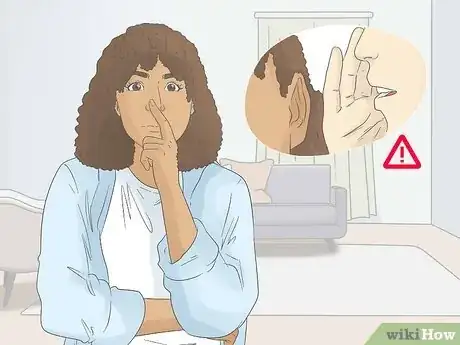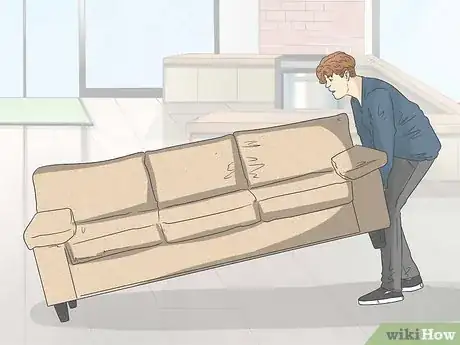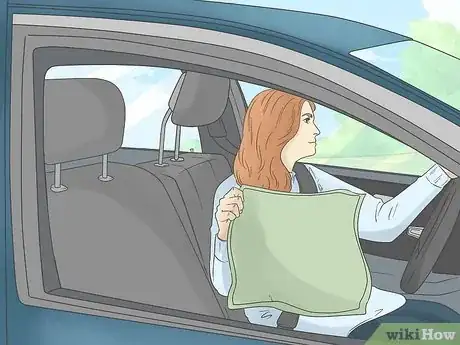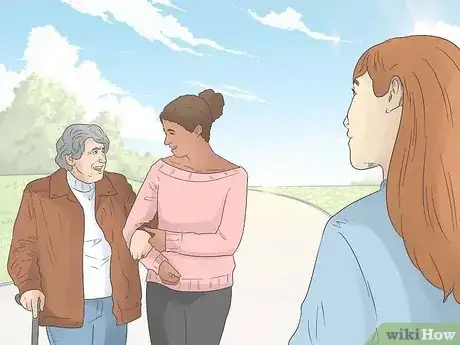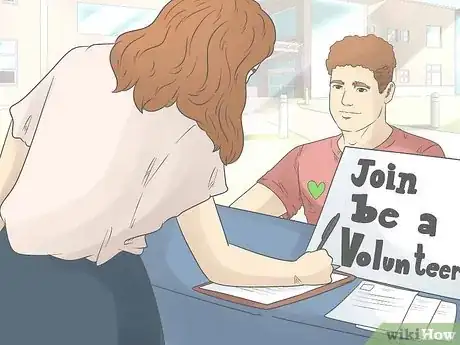X
This article was co-authored by Tasha Rube, LMSW. Tasha Rube is a Licensed Social Worker based in Kansas City, Kansas. Tasha is affiliated with the Dwight D. Eisenhower VA Medical Center in Leavenworth, Kansas. She received her Masters of Social Work (MSW) from the University of Missouri in 2014.
There are 11 references cited in this article, which can be found at the bottom of the page.
This article has been viewed 38,229 times.
If you're used to life in a big city, adjusting to life in a small town can be difficult. Small towns are very different from busy metropolises, but you might find that the new, slower pace of life is easier to adjust to and enjoy than you imagined.
Steps
Part 1
Part 1 of 4:
Adapting to Small Town Life
-
1Avoid getting involved in gossip. In small towns, gossip is fairly common. Since the population is smaller and a bit more intimate, it might seem like everyone knows each other—and that everyone knows everyone else's secrets, too. Avoid involving yourself in these kinds of conversations.
- When talking to anyone about someone else in town, ask yourself if you are about to say something you would be okay saying directly to the subject. If it's judgmental or private, try to keep it to yourself.
- If the conversation shifts into gossip, try to move it to something else without being rude. Offer up some good news, or ask some questions of the people you're speaking with. Keeping the conversation focused on the people present in it can be helpful for avoiding gossip.
-
2Befriend other former city dwellers. You might find that some of the new people you meet also relocated from a larger city. These people might be especially helpful when it comes to learning the ins and outs of small town life, particularly since they went through the same transition.
- Try social networks as a way to find people with common interests in your new town. Don't lose hope if you don't find a new best friend immediately; relationships might take a little bit longer to forge in a smaller town where everyone knows everyone else. You may have to work a bit harder to be let in and trusted.[1]
Advertisement -
3Limit your expectations. If you expect your life to be exactly the same as it was, just on a smaller scale, you will end up disappointed. You might have to shop at a local grocer rather than the big retailer you're used to. Or, you might not have a huge group of people your age that you do everything with. Understand that downsizing to a small town will mean some aspects of your everyday life will change.[2]
- If you're used to noisy, crowded clubs and a vibrant nightlife in the big city, you may have to adjust to more low-key, laid back evenings when you move to a small town. Try finding new things to do on weekend nights rather than being upset that you can't keep doing what you're used to.
-
4Make your own judgements. Regardless of what you may hear from locals or even read online about the town and the people in it, be sure to make your own judgements and decide for yourself how you feel about your new community.
- Though small town gossip and cliques are still prevalent, the new generation has taken to voicing their negative opinions and gossip on internet forums. Rather than buying into what anonymous citizens have posted, get to know people and places for yourself.[3]
-
5Be patient. The pace of small town life is generally slower than in the big city. This might mean that there will be less going on in town—or even that the contractor you need to help fix a problem in your house won't be able to come out right away. Learn to be more patient and focus less on instant gratification.[4]
- You may have to take the initiative to make things happen a bit more in a small town. If you want something fun to do, or to get together with new friends, be the first one to make the phone call or to organize an event.
Advertisement
Part 2
Part 2 of 4:
Getting Settled in Your Neighborhood
-
1Meet your neighbors. It might seem intimidating to walk right up and knock on a stranger's front door, but your neighbor might be thinking the same thing, so be the one to make the first move. Or, if you see your neighbor outside, make it a point to say hello and introduce yourself.
- In small towns, people are usually very tightly knit, and it might seem difficult to wedge yourself into existing relationships and cliques. But, by going out of your way to make the first move and give your new neighbors a good impression, you might find that people are more receptive to including you.[5]
- Make sure you come off as approachable. Try going for walks in the neighborhood, and avoid talking on the phone, texting, or keeping your earbuds in as you go about your business. If you look open to talking, more people might be prone to say hello or start a conversation.[6]
- Don't feel obligated to bring your new neighbors a gift when you go to introduce yourself. Instead, just use your move as a way to start the conversation. You could go next door and apologize for any noise or inconvenience your move-in may have caused, and then use that as a way to ask them questions and get to know them a little better. They'll appreciate your consideration.[7]
-
2Avoid making comparisons to big city life. Relocating from a big city to a small town is a big change. Many aspects of your daily life will be very different, from getting groceries to your morning commute. If you try to look at the experiences separately rather than comparing them to one another, you might be able to better appreciate the differences and changes.
- For example, rather than missing the hustle and bustle that used to come with your morning commute, take a moment to appreciate how much easier and relaxed your new small-town commute is.[8]
- Avoid thinking in terms of what is missing. Instead, think in terms of what is new and present. If you miss the view of a city skyline, maybe you can instead appreciate the view of hills and mountains, or whatever type of landscape your new small town offers.
-
3Incorporate the comforts of your former city home. Just because you have left the city doesn't mean you have to leave everything about it behind. There are ways to incorporate big city elements into your small town just by bringing them into your home.
- Use the city as your design inspiration in your new home. Think about the things you liked most about the big city, or the things that first come to mind when you think of it—traffic, noise, bright lights and colors. Bring these elements into your home with decoration, artwork, and accents.[9]
- Look in thrift stores and antique shops for old road signs or traffic lights to use as decorations. Hang a photo or painting of a city skyline on a wall in your house. Use photos of your old home to create a photo collage of memories to look at when you miss the city.
-
4Find new things to admire and enjoy. Even though life in a small town is a lot different from life in a big city, there are plenty of things about small town life to admire and enjoy. From new landscapes to nicer people, try your best to acknowledge the things you like about your small town.
- Living outside of a big city allows you to get closer to nature. If you're a parent, you will be able to raise your kids to enjoy nature and wildlife, rather than have them glued to electronics or immersed in advertisements and overwhelming stimulation.
- Use your new location as a way to find new hobbies and things to do. Whether you're single, married, have kids, or don't have kids, there will be new opportunities for you to try new things that you may not have been able to experience while living in the city.
Advertisement
Part 3
Part 3 of 4:
Learning About Your Town
-
1Drive around the town. The best way to feel more at home is to familiarize yourself with your new surroundings. Take in all the sights. Map your way to the local grocery store, coffee shop, or park. Learn your way around by exploring rather than relying on a GPS.
- You can also take a walk around the neighborhood rather than driving. In small towns, things might not be as close together as they are in a big city, but taking a walk can be a relaxing way to see what's close to your house.
- If you have children, look for local playgrounds, the library, and the schools. Life for a child in a smaller town can be especially rewarding, since it usually has a lot more space for outdoor play than you might find in an urban setting.
-
2Adapt to new social norms. Traditions and mannerisms in a big city can be very different from those in a small town. From social etiquette to transportation to grocery shopping, you might find that you have to adjust your former behavior to match the new town you're in.
- In smaller towns, you might find that people are less prone to just stare at the ground and ignore everyone as they go about their day. People might be more trusting and open, and will want to interact with you more than strangers in a big city might.
- Crime is sometimes lower in smaller towns, due to the close-knit nature of many small towns. There is less of a sense of anonymity. People might even leave their doors unlocked. It might even feel like everyone seems to know each other.
-
3Find your new favorites. As with any kind of move, you will be leaving behind some things you have grown to love and are accustomed to. For example, you may have gotten your morning coffee at the same busy shop every morning in the city, so now you will have to find a new shop to patronize.
- The locals will be your best source of information on the town. They live there, and they know what spots are great. Try patronizing local establishments like farmers markets, restaurants, and shops.[10]
- Small towns are often full of independently owned shops and restaurants. Rather than sticking to familiar franchises, branch out and try something new.[11]
-
4Observe and talk to the people in the town. When you're trying to learn how to live and behave in your new small town, looking around you is the first step. Take mental note of how other people talk to you and interact with you. Notice which shops and restaurants have the biggest crowds.
- Just like you learned your habits and behaviors in your previous city, you can learn the same things the same way in a small town. A key to avoiding that initial anxiety is to recognize that other people aren't as concerned about your behavior as you are. Relax and observe others, and respond accordingly.[12]
Advertisement
Part 4
Part 4 of 4:
Becoming Involved in the Community
-
1Join a group or organization. People in smaller towns tend to value volunteerism a bit more, and you might find that there are a good number of opportunities to help out. Check the local recreation center or library for a calendar or list of clubs and meetings. Find something that interests you and join up! You will meet new people and get to know your town.
- If you are a parent, join the parent teacher organization at your child's school. You will meet other parents and immediately have something in common. You can also engage your kids in team sports or extracurricular activities to help them meet more people. This can help your children (and you!) adjust a bit more smoothly.[13]
- Sign up to volunteer. People in small towns often have values that center around community involvement and family. Volunteering at a food drive, soup kitchen, or event can connect you with other people while also showing the people in your new town that you share their values.
-
2Attend a town hall meeting. Visit the Chamber of Commerce in your new town to get a schedule of meetings, and also to get information on local services and businesses. Becoming involved in the ins and outs of your town will really help you feel more familiar with it.[14]
- Not only will you meet other people in your town at these events, you will also have a chance to hear what is important to them in regards to the way the town functions and what happens within it.
-
3Subscribe to the local newspaper. Reading the local paper every day will give you a sense of what's going on in your town. Newspapers also often have calendars of upcoming events, as well as advertisements for local businesses, restaurants, and shops.
- People in small towns often care about different things than people in larger cities. Reading the paper will give you an idea of what people in your town care about, and it will offer some talking points you could bring up when meeting new people in the town.[15]
Advertisement
References
- ↑ https://www.apartmenttherapy.com/10-tried-true-tips-how-to-make-new-friends-in-a-new-city-187285
- ↑ https://www.washingtonian.com/2015/08/17/thinking-of-moving-to-a-small-town-read-this-first/
- ↑ http://www.nytimes.com/2011/09/20/us/small-town-gossip-moves-to-the-web-anonymous-and-vicious.html?_r=0
- ↑ http://www.streetdirectory.com/travel_guide/8058/self_improvement_and_motivation/are_you_thinking_about_moving_to_a_small_town.html
- ↑ https://www.washingtonian.com/2015/08/17/thinking-of-moving-to-a-small-town-read-this-first/
- ↑ http://www.trulia.com/blog/5-tips-get-settled-new-neighborhood/
- ↑ http://www.rent.com/blog/relocating-how-to-meet-your-new-neighbors/
- ↑ http://www.countryliving.com/life/a35783/why-i-left-a-big-city-for-a-small-town/
- ↑ http://freshome.com/2013/06/27/what-to-consider-when-bringing-urban-loft-style-into-your-home/
- ↑ http://www.trulia.com/blog/5-tips-get-settled-new-neighborhood/
- ↑ https://www.apartmenttherapy.com/10-reasons-why-i-love-living-in-a-small-town-173511
- ↑ http://www.huffingtonpost.com/jodi-aman/overcome-social-anxiety-b_b_9810796.html
- ↑ http://www.moving.com/articles/meeting-people-after-moving.asp
- ↑ http://www.moving.com/articles/meeting-people-after-moving.asp
- ↑ http://www.moving.com/articles/meeting-people-after-moving.asp
About This Article
Advertisement
